2022 ERIES Awardees
Congratulations to our 2022 Environmental Research, Innovation & Engagement Startup (ERIES) Awardees.
THE SHORTER SHOWER INITIATIVE

Abstract:
Water waste has two pernicious negative effects. First, the delivery and heating of water is a significant contributor to global warming because water usage constitutes about 5% of CO2 emissions in the US (Griffiths and Wilson, 2009) and studies elsewhere indicate that roughly 60% of such emissions are due to hot water bathing (Okamato, 2015). Reducing the quantity of water used in bathing is therefore one of the ways in which individuals in the aggregate can make a direct contribution to curtailing the release of CO2. Second, overuse of water can impose unnecessary costs on states, institutions, and households, a significant current concern given the steep increases in energy prices across the globe. Achieving reductions in water use for showers would therefore be doubly beneficial.
This project will test the following over a several-year period:
1. What forms of messaging and eco-education will influence rates of water use?
2. Will the provision of regular, granular data on water use on each floor affect shower length?
3. Will competition among floors/ dormitories motivate a reduction in water usage?
4. Will withdrawing/absence of information and incentives will lead to changes in shower duration?
This project will give 8-10 students cross-disciplinary research experience in survey design, behavioral messaging, and data analysis. Additionally, it will give ~100 students the opportunity to participate in citizen science, and enable the team to submit funding applications to state and national agencies committed to responsible water use and combating climate change.
Faculty Team Members:
- Lead: Nathan Moore, Department of Geography, Environment, and Spatial Sciences
- Collaborator: John Waller, Department of History and Social Science Scholars Program
- Collaborator: Maria Lapinski-Lafaive, Department of Communication; Health and Risk Communication Center; MSU AgBioResearch
Student Team Members:
- Samyuktha Iyer, MSC (Environmental Economics) Ruth Heo - 2nd year doctoral student (Communications)
- Hyung Rho Yoon - 2nd year MA student (Communications)
- Kayla Tracey - Freshman Undergraduate (Communications and Psychology)
- Sharmila Suresh - Junior Undergraduate (Economics)
- Shruti Elango - Junior Undergraduate (Economics)
- Shubham Aggarwal - Junior Undergraduate (Economics)
- Denis Selyuzhitsky - Sophomore Undergraduate (Mathematics & Economics)
On-farm Renewable Electricity Harvesting from Agricultural Water Systems

Abstract:
The long-term goal of this project is to improve energy conservation and use efficiency in agricultural water systems by developing innovative on-farm renewable electricity generation technology based on electrokinetic effects in water pipes. On-farm renewable energy will benefit farmers in saving energy cost and building economic resilience against energy prices fluctuations, help curb greenhouse gas emissions, and achieve agricultural sustainability. Hydropower is abundant in agriculture. Agriculture consumes about 70% of global freshwater use and agricultural water systems (mainly irrigation and drainage systems) transport a large quantity of water every year. Electrokinetic effect is the phenomenon that liquid flow over a surface generates a streaming current or streaming potential. Electrokinetic energy harvesting employs a simple approach (all needed are a channel and water flow) and has no threshold of flow rate for energy harvesting because as long as water is moving then the generated electricity can be harvested. Additionally, the existing pipelines in agricultural water systems (i.e., irrigation and water drainage pipes) already provide the working surfaces for electricity generation from the electrokinetic effects when water flows through the pipelines, which makes the installation much simpler. If successful, in a hypothetic situation, if the amount of water used for irrigation every year in United States flows through one 100-meter long 5-inch irrigation pipe, the pipe can generate about 2.7 trillion MWh electricity annually when the water flow rate is only 20 gallon/min.
Team Members:
- PI: Bei Fan, Mechanical Engineering
- Co PIs: Wei Zhang, Plant, Soil, and Microbial Sciences
- Younsuk Dong, Biosystems and Agricultural Engineering
- Ehsan Ghane, Biosystems and Agricultural Engineering

